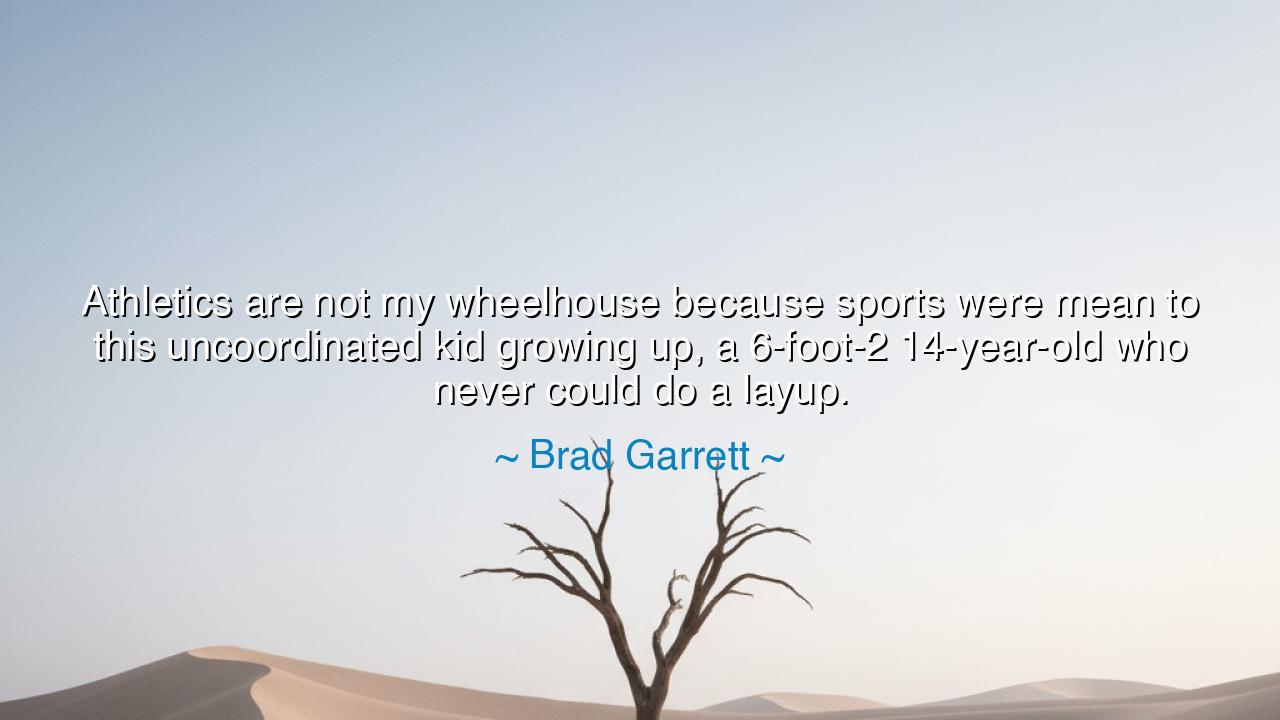
Athletics are not my wheelhouse because sports were mean to this
Athletics are not my wheelhouse because sports were mean to this uncoordinated kid growing up, a 6-foot-2 14-year-old who never could do a layup.






When Brad Garrett confessed, “Athletics are not my wheelhouse because sports were mean to this uncoordinated kid growing up, a 6-foot-2 14-year-old who never could do a layup,” he spoke with the honesty of one who carries the memory of youthful struggle. His words remind us that not all who are tall or strong are destined for triumph in sports, and that sometimes the arena of play, which should inspire, instead wounds. The image of a boy towering over his peers, yet fumbling with a simple layup, is not merely about missed shots—it is about the pain of expectation unmet, and the cruelty of a world that often mocks weakness rather than nurturing growth.
The ancients, too, knew that the arena could be harsh. In the Greek gymnasium, boys who could not keep pace with their peers were often ridiculed, while only the swift and strong were honored. Yet philosophers like Socrates warned against measuring a person’s worth by physical skill alone. Socrates himself was known for his odd appearance and lack of athletic grace, yet his mind reshaped the world. Garrett’s words echo that ancient wisdom: not every gift blooms in the stadium, and we must learn to value what lies beyond muscle and coordination.
His phrase, “sports were mean,” is striking. It points to the darker side of competition—the exclusion of those who cannot keep up, the jeers that break young spirits, the feeling of being an outsider in a culture that prizes physical success. For a child of great height, the world expected natural dominance, yet nature gave him not the coordination of an athlete but the voice, wit, and presence of a performer. This mismatch between expectation and ability becomes a crucible, shaping identity in unexpected ways.
History gives us a mirror in Abraham Lincoln, who as a youth was tall and lanky, awkward in body, and often mocked for his ungainly movements. Yet in time, he learned to turn his differences into strengths, standing above others not in physical grace but in moral courage and eloquence. Like Garrett, who later rose to fame through comedy, Lincoln’s story shows us that weakness in one field may become the soil from which greatness in another springs.
Garrett’s reflection also carries a hidden lesson about kindness. The pain he recalls came not simply from being uncoordinated, but from the way others responded to it. When competition is stripped of compassion, it becomes cruelty. Yet when patience and encouragement are given, even the clumsy find joy in movement. The true spirit of athletics was never meant to exclude, but to build resilience, discipline, and fellowship. His words challenge us to restore that spirit, so no child feels crushed for failing to fit the mold.
The lesson is clear: do not measure yourself—or others—solely by the standards of the crowd. Where one path closes, another opens. A missed layup may close the door to basketball glory, but it may open the way to the stage, to laughter, to gifts the world had not yet imagined. The human soul is vast, and each person carries within them a wheelhouse of strengths waiting to be discovered, even if it is far from the gymnasium.
Practically, this means guiding the young with compassion. Celebrate effort more than talent, nurture individuality rather than enforcing uniformity. And for ourselves, it means releasing the shame of what we cannot do, and instead pouring our energy into the gifts that are truly ours. Not every tall child is an athlete, not every small one is weak, and not every awkward soul is destined for failure. Greatness appears in many forms, often hidden in the very places where the world least expects it.
Thus, Brad Garrett’s words shine as both confession and wisdom: sports may not have welcomed him, but his uncoordinated youth became the soil of humor and resilience. In this, we are reminded that our wounds may become our strengths, and that the measure of a person is never confined to the playing field, but revealed in the fullness of the life they dare to live.






AAdministratorAdministrator
Welcome, honored guests. Please leave a comment, we will respond soon